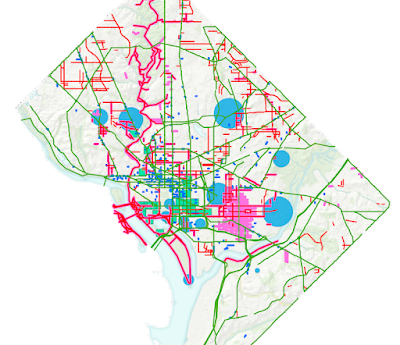Washington D.C.'s Truck Restriction Camera Program utilizes automated enforcement cameras to monitor and enforce truck restrictions on certain roads within the District. The program aims to ensure that commercial vehicles adhere to designated truck routes and restrictions, promoting safety and minimizing the impact of heavy traffic on specific streets.
Here's how the program typically works:
- Camera Placement: Cameras are strategically placed at various locations throughout Washington D.C. These locations are chosen based on their proximity to restricted roads and areas where heavy commercial vehicle traffic is not permitted.
- Monitoring Truck Violations: The cameras are equipped to detect and capture images or videos of commercial vehicles that violate truck restrictions by traveling on prohibited routes or roads.
- Automated Enforcement: When a violation is detected, automated processes are triggered to issue citations or fines to the registered owner of the violating commercial vehicle. The fines are typically sent by mail to the vehicle owner's address.
- Purpose: The Truck Restriction Camera Program aims to improve traffic flow, reduce congestion, enhance road safety, and protect infrastructure by ensuring that commercial vehicles use appropriate routes and avoid restricted areas within the District.
Definition of Commercial Vehicles
DDOT ensures that commercial vehicles traveling in the District move efficiently and safely, while also addressing community impacts and preserving transportation infrastructure. Commercial vehicles play a vital role in the District of Columbia, providing goods and services to thousands of residents and businesses daily.
The unique urban environment and diverse land uses shape the District's regulations governing trucks and commercial vehicles. The information provided here is for educational purposes; please refer to the official District of Columbia Municipal Regulations (DCMR) for current rules and regulations.
A Commercial Vehicle is any four-wheeled vehicle longer than twenty-two feet, used for transporting commercial loads or property, designated as such on its certificate of title, or displaying an irremovable commercial advertisement or insignia.
Commercial Vehicle Routes & Restrictions
The District designates citywide truck and bus routes to be used as much as possible until reaching the final destination. Maps also indicate where bus and through truck travel is restricted. Only a few streets in DC are completely off-limits to trucks. Unless near sensitive federal structures, a truck restriction means the street is closed to through truck traffic but open to trucks making local deliveries.
DDOT’s Truck Route Trip Planner
DDOT offers an interactive tool to map the best routes for large vehicles traveling through the District. Customize your vehicle dimensions and weight, set your origin and destination, and generate a route.
Commercial Vehicle Restrictions approaching Washington DC
Trucks are not allowed on the Roosevelt Bridge entering/exiting DC and Virginia. Trucks are also prohibited on I-66 east of I-495. Contact the Virginia Department of Transportation for details on Virginia truck restrictions. The National Park Service manages parkways near DC with varying commercial vehicle restrictions.
Oversized / Overweight Vehicle Permits
DC imposes size and weight restrictions on vehicles. Those exceeding these limits need an Oversize/Overweight permit to operate within the District.
Current Freight Projects and Studies
DDOT is conducting studies to improve truck route signage and update the District Freight Plan, including exploring sustainable delivery methods.
Curbside Regulations & Programs
Commercial vehicles have specific parking regulations, including restrictions on double parking, parking in residential areas, and parking at meters during peak hours. Commercial loading zones support business deliveries. Pick-Up Drop-Off (PUDO) Zones are dedicated to passenger and commercial loading.
Tractor-trailer parking is limited; private lots like Union Station Parking Garage may accommodate.

